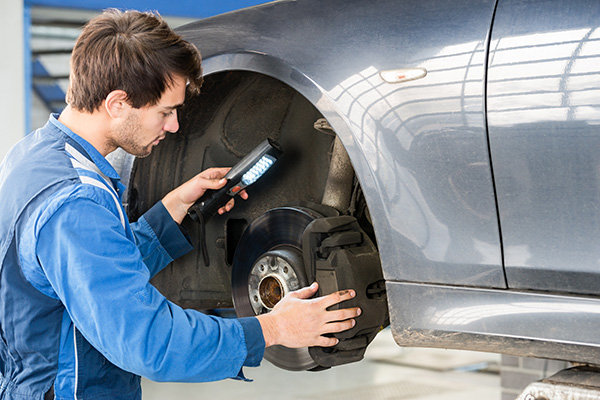
Do you hear a high-pitched squeal that starts ringing out every time you press the brake pedal? It’s not just annoying—it’s concerning. Brake noise is something most drivers will experience at some point, but understanding why it happens and how to address it is key to keeping your vehicle in top shape. Learn what causes brakes to squeal and how to fix the issue before it becomes a bigger problem.
Why Do Brakes Squeal?
Brake squealing is more than just an irritating sound; it’s often a sign that something needs attention in your braking system. Several factors can contribute to the noise, ranging from minor issues to more severe ones.
Here are some common causes of brake squeal:
Worn Brake Pads
The most frequent reason for brake squealing is worn-out brake pads. As pads wear down, the material thins and a metal wear indicator built into the pad contacts the rotor, causing a squealing sound. This is actually a design feature intended to alert drivers that their pads are nearing the end of their life and need replacement.
Dust and Debris
Brakes are exposed to the elements, meaning they’re prone to collecting dust, dirt, and grime. Debris trapped between the brake pad and rotor can create friction, leading to squealing noises.
Moisture on the Rotors
A thin layer of rust can form on the brake rotors overnight if there’s moisture in the air. This rust can cause a temporary squeal the first few times you brake. The sound usually goes away once the pads rub off the rust, but if it persists, it may indicate a more serious problem.
Glazed Brake Pads or Rotors
If your brakes have overheated, it can cause the pads or rotors to become glazed. This happens when the surface becomes overly smooth or even shiny, reducing the effectiveness of braking and causing noise.
Loose Brake Components
Sometimes, the squealing is caused by loose or improperly installed components within the braking system. For example, loose calipers or brake pads that aren’t seated properly can vibrate, resulting in a squeal.
How to Stop Brakes from Squealing
While brake squealing can be unnerving, there are steps you can take to fix the issue and get your vehicle back to its quiet, smooth stopping. Depending on the cause, the solution can range from a simple cleaning to replacing key parts in your braking system.
Replace Worn Brake Pads
If your brake pads are worn down, replacing them is the most straightforward solution. Installing high-quality brake pads will eliminate the squealing and ensure your brakes are functioning safely. Make sure to choose pads suited to your driving style and vehicle to avoid premature wear.
Clean Brake Components
A thorough cleaning of your brakes can remove dust and debris, reducing the chances of squealing. You can either do this at home or have a professional clean your brakes during routine maintenance.
Address Moisture Issues
If moisture or rust is causing the squeal, driving the car for a few minutes can help clear the problem. If the noise persists after this, it may indicate a larger issue, like worn components or warped rotors.
Inspect for Glazing
If you suspect your brakes are glazed, you’ll need to have the pads and rotors inspected. Glazing requires either resurfacing or replacing the affected parts, depending on the severity of the wear.
Tighten Loose Parts
Ensure that all brake components are properly secured. Loose parts can often be the source of vibration and noise. If you’re unsure, a qualified technician can perform a detailed inspection and make the necessary adjustments.
Preventing Brake Squeal in the Future
Once you’ve addressed the current squealing issue, there are several steps you can take to minimize the chances of it returning. Regular brake maintenance is key to ensuring your system runs quietly and efficiently.
Here are some preventive tips:
Routine Inspections
Have your brakes checked regularly, especially during other service appointments like oil changes. Catching worn pads, misaligned components, or rust early can prevent more significant issues later on.
Use Quality Brake Pads
Cheaper pads may save money upfront, but they’re more likely to cause noise and wear out quicker. Invest in high-quality pads designed for your vehicle to improve performance and reduce noise.
Brake Softly
If you’re in the habit of braking aggressively, try to ease up. Hard braking generates more heat, which can lead to glazing and premature wear. By braking gently, you can extend the life of your pads and reduce noise.
Keep Your Brakes Clean
Regularly cleaning your brakes helps remove dust, debris, and other contaminants that can lead to squealing. This is especially important if you live in a dusty area or drive in harsh conditions.
Tired of dealing with noisy brakes? Visit Guthrie’s Auto Service for expert brake service and maintenance. We’ll make sure your braking system is safe, reliable, and noise-free. Schedule your appointment today!